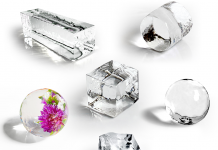It’s been a long, cold winter, and chances are, your skin has suffered from the dry indoor heat, low humidity, and biting wind.
“If skin gets too dry you can develop cracks and fissures—which is a breakdown in the outer layer of the skin,” explains Dr. Barry LaBine, board-certified dermatologist and medical director of Refine Dermatique Skin & Laser Center in Sartell. “This results in a loss of integrity of our protective barrier.”
The best way to restore this barrier, says Dr. LaBine, is by applying emollient type moisturizers that hydrate without a greasy side effect. Other factors that rob our skin of moisture include hot water, alcohol-based cleansers, hormones, stress levels, alcohol, nicotine, and artificial colors and fragrances. Dr. Kristina Shaffer of Dermatology Consultants, P.A., suggests using mild fragrance-free products and a thick moisturizer immediately after showering to lock in moisture and restore the skin barrier. “Look for fragrance-free creams with ingredients that pull moisture into the skin such as alpha hydroxy acids and ceramides, and ingredients that improve the barrier function such as dimethicone and glycerin,” she comments.
Dr. Charles E. Crutchfield III, clinical professor of dermatology at the University of Minnesota Medical School and medical director of Crutchfield Dermatology recommends lotions and creams rich in lipids and ceramides as well as bathing with a non-detergent cleanser, such as the Vanicream cleansing bar. “It lathers up well and will not dry out the skin,” he comments. Head into spring with your best face forward by cleansing, toning, and moisturizing twice a day, every day, and then adding a facial steam with or without a mask about once a week. Another way to protect your skin is to apply sunscreen every day. Dull, rough skin, sunspots, splotchy blood vessels, wrinkles, and uneven skin tone can be related to chronic sun exposure.
“I can’t stress enough the importance of daily sun protection,” says Dr. LaBine. “A broad-spectrum sunscreen is the No. 1 product you can buy.” He points out that the majority of our sun exposure is incidental—walking to and from our car, driving, sitting all day near a window at work–which is why sun protection is so critical. Sunscreen shouldn’t just be used at the beach. “Skin cancer has become an epidemic,” he says. “Pay attention to your skin. If there’s an area that’s changing in color, size, or won’t heal, it should be evaluated.” At Dermatology Consultants, “We see and treat patients with skin cancer every day,” says Dr. Shaffer. “We used to think sun damage happened when we were young, but in fact, we can damage our skin at any age if we aren’t careful.” Cancers can range from mild, slow growing types to aggressive cancers that need immediate attention. The only way to determine if you have skin cancer is a complete full-body skin exam. It’s especially important to schedule an exam if your hobbies include golfing and/or fishing.

Get the glow
“The basis of skin rejuvenation is to stimulate the skin to produce new collagen, elastic tissue, dermal “ground substance” and epidermis,” explains board-certified dermatologist Dr. Elizabeth Briden, CEO and medical director of Advanced Dermatology and Cosmetic Institute, located in Edina.
One of the exciting rejuvenation techniques available today is Advanced Bionic Laser Rejuvenation (Advanced BLR or augmented fractional laser), a highly effective non-invasive procedure that uses a fractional laser to penetrate the dermal layers of the skin, followed by the application of a bionic serum—made from lactobionic acid, a natural component of the body—after the procedure. “This combination does a fantastic job of skin rejuvenation without down-time and leaves the skin with a beautiful, healthy glow,” says Dr. Briden, who offers medical and cosmetic dermatology services, as well as a full line of cosmeceutical skin care products.
Another way to remove dead skin cells and help new cells come to the surface for a healthy looking “polished glow” is through a glycolic peel or a Sciton light laser peel, says Chris Cairl, B.S., licensed aesthetician and founder of the Roseville-based Christina Clinic. Laser resurfacing can be effective in eliminating the wrinkles around the mouth and eyes, as well as improving skin tone, texture, and color. A combination of the Broadband light, skin tightening, and laser peel is a popular option for achieving even skin tone, clear skin, and a more youthful look. “We can use all three methods in one treatment to address different issues,” Cairl says.
At Dermatology Consultants, hydrating treatments can be added following a peel. “We will tailor peels and combine different peeling agents to target different problems in one session, using low-level red light to decrease inflammation and promote faster healing,” says Dr. Shaffer. A liquid facelift with Fire and Ice peels is a popular treatment at Crutchfield Dermatology, combining anti-aging cosmetic fillers, relaxers, and natural skin rejvenation techniques for impressive results requiring very little downtime. “We blend a series of small things for a dramatic effect without surgery,” says Dr. Crutchfield. At Refine Dermatique Skin and Laser Center, the focus is on using products that have passed vigorous scientific testing for proven effectiveness in smoothing uneven texture and improving skin’s elasticity, such as those containing antioxidants, peptides, retinol, and topical vitamin A “a workhorse in skincare,” says Dr. LaBine. “It’s effective at cell turnover, which slows with age. The clients that use retinol are the happiest long-term with their skin, it unplugs pores, reduces fine lines, boosts collagen production, and improves texture.”
When it comes to wanting skincare results, “be patient,” he says. “It may take three months to a year to see improvements. The damage didn’t happen overnight, and neither will the improvement.”
The good news, though, he says, is that “It’s never too late to start properly caring for your skin.”
Advice from the experts:
• Use sunscreen—a minimum rating of SPF 30—every day. Reapply every two hours when outdoors, especially if swimming or perspiring. The body requires about a shot glass full of sunscreen for effective application; the face requires about a nickel-sized dollop. A good rule of thumb is to put your sunscreen on as usual, then put it on again. (Most people only use half the amount they should be using.) Wearing sunscreen should become as much a part of your regular routine as brushing your teeth.
• Medications that suppress the immune system, as well as tetracycline antibiotics (often used for acne) and water pills (thiazides) used for high blood pressure can make you more sensitive to the sun, so limit your time outdoors if possible.
• Wear a wide brimmed hat, protective clothing, and sunglasses if you plan on being outside for long periods of time, particularly between the hours of 10 a.m. and 2 p.m.
• The only “safe” tan is a sunless spray tan. A tan from the sun is your body’s response to severe DNA damage due to UV light. A tanning bed delivers 10-15 times more UV radiation than natural sunlight and increases the risk of developing melanoma, the deadliest form of skin cancer.
• Don’t be fooled by fancy packaging and boastful claims about a product’s effectiveness without scientific backing. Do your research.
• If you smoke, quit. Smoking is associated with premature wrinkling (amongst a host of more serious health issues).
• Dermatologists are skin care experts with years of specialized training and knowledge to effectively treat your skin care concerns, from cosmetic to chronical medical conditions to skin cancer. See a board-certified dermatologist for a personalized treatment plan and full body skin cancer screening exam.
• Nourish your skin from within by eating fruits and vegetables, foods rich in omega-3 fatty acids (wild salmon, fortified eggs, walnuts), drinking plenty of water, getting adequate sleep, and minimizing stress.
• Beautiful skin is a combination of genetics, science, common sense, a healthy lifestyle, and a regular skincare regimen.
Resource guide
Advanced Skin Therapeutics
skintherapy.com
Christina Clinic
christinaclinic.com
Crutchfield Dermatology
crutchfielddermatology.com
Dermatology Consultants
dermatologyconsultants.com
Refine Dermatique
refinedermatique.com






